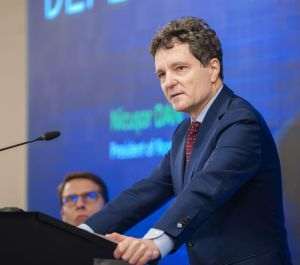Reporter: What are your objectives in the current term of office as vice president of the Financial Supervisory Authority, responsible for the capital market?
Maria Gabriela Horga: The absolute priority of this mandate is the implementation of the National Strategy regarding the development of the capital market in Romania for the period 2023-2026, approved by a government decision, but which must be brought to fruition, carried out through ambitious objectives and, obviously, in the following years, by achieving results.
The first months of my mandate as coordinating vice-president of the Financial Instruments and Investments Sector of ASF put me in front of several ongoing projects, at various stages.
A priority for me was related to the need to update the regulations, so I got directly involved in the effort to update the legislation in the field. The transmission of the draft emergency ordinance on supplementing the legislation related to the capital market and combating misleading advertising in the field of investments by the FSA to the Ministry of Finance is a significant step in the legislative process. The project was in the decision-making transparency procedure, being in the approval phase and going to be discussed and submitted to the Government's approval.
I propose that, in the future, we keep a fast pace of the process of updating the legislation, on the side related to the ASF. We will continue the discussions with the actors in the field, respecting the principle of transparency and taking into account the EU standards regarding the capital market.
I also want to increase the attractiveness of the capital market and increase investor confidence in financial instrument markets. In this sense, I am a supporter of single listings on the Bucharest Stock Exchange, understanding that we have untapped growth potential in terms of liquidity the market.
Another element of support in the effort to mature the capital market in Romania is represented by the development of derivative financial instruments markets, which supports the need of investors to have means of diversification and structuring of investments, giving them the opportunity to manage financial risks and creating the framework for increasing liquidity in the market of supporting instruments.
Last but not least, I support the creation and maintenance of a transparent, stable and predictable legal and fiscal framework, an essential condition to attract funds and fund managers. Clear and favorable legislation that provides tax benefits and advantages for investment funds and their managers can stimulate the interest of both investors and managers.
Reorter: Recently, the Authority approved the request of the Bucharest Stock Exchange regarding the authorization of the derivatives market in our country, but the market will not become effectively functional until the Central Counterparty is operationalized. ASF is one of the entities that must approve the CCP's file, which will later be sent to ESMA for approval. What is the status of the Central Counterparty, from the perspective of the Financial Supervisory Authority's attributions in this project?
Maria Gabriela Horga: As I mentioned, an essential element of the Capital Market Development Strategy is the development of derivative financial instrument markets, which implies, implicitly, the operationalization of the Central Counterparty.
This objective can be achieved through the involvement and effort of all relevant parties, with the FSA's competence to intervene being linked to the administrative component of the project. At this time, we are doing everything in our power to ensure support to complete this project that started many years ago as soon as possible.
I specify that CCP.RO submitted the official request for authorization to the Authority on January 31, 2023. The request is submitted based on the provisions of the European Market Infrastructure Regulation (EMIR) and ASF Regulation no. 3/2013.
Given that the initially sent file was incomplete, ASF asked CCP.RO for additional information and documents. It is important to remember that the Authority approved the extension by another six months of the initial period of a maximum of 12 months that CCP.RO had at its disposal to submit all the additional documents and information requested.
The submission of complete documentation will be followed by a six-month period allocated to the authorization process. Under EMIR, the competent authority is required to inform the applicant CCP in writing within six months of submitting a complete application. This notification must include a fully reasoned explanation indicating whether authorization has been granted or refused. At the same time, within four months from the declaration of the CCP file as complete, ASF will draw up the evaluation report according to EMIR and submit it to the attention of the College.
• ASF last year issued 30 alerts on unauthorized entities and more warnings on 68 deceptive websites
Reporter: In recent times, misleading advertisements in the field of investments have intensified in the online environment. How does the Authority intend to prevent such practices?
Maria Gabriela Horga: Indeed, recently we are witnessing a phenomenon related to misleading advertising in the online environment, which promotes certain so-called "investments" through the use of manipulation techniques.
Here, from my perspective, there are several elements that are relevant and that contribute to the propagation of this phenomenon.
First of all, these types of ads try, and probably in many cases even succeed, to exploit a social vulnerability related to the level of financial education of the target audience.
Messages that promise or guarantee significant gains seem to come from personalities who enjoy notoriety and credibility, creating the illusion of reality precisely against the background of a low level of financial education.
In many situations, image manipulation techniques create grossly flawed results. Currently, citizens can avoid being victims if they show reluctance and avoid accepting invitations without a minimum of verification from official sources.
Deepfake techniques are unfortunately improving day by day, so it is important that people benefit from financial and digital education.
Here I recall the efforts that the ASF makes to increase the level of financial education by getting involved in educational programs dedicated to pupils and students, which are already part of the current activity of the authority, as well as by the steps taken in order to fulfill the objectives set out in the National Development Strategy capital market in Romania for the period 2023 - 2026.
At the same time, I think that all those who are aware of the existence of this phenomenon and even support it, indirectly, invoking elements related to freedom of expression and commercial aspects, and I mean the administrators of streaming and social media platforms, should get involved and make sustained efforts to increase the safety level of the published content.
From an administrative point of view, of the ASF, whenever entities have been identified that raise suspicions regarding the illegal offering or rendering of investment services and activities in Romania, public warnings have been issued on their own website and, as the case may be, they have been notified to the competent criminal investigation bodies.
Publication of 30 Unauthorized Entity Alerts and 68 Website Warnings in 2023 highlights ASF's vigilance in protecting investors and combating illegal activities in the field of investment services and activities.
These actions were carried out observing the limits of legal competence held.
Being aware of the extent of this phenomenon, the proposal to amend the legislation was also introduced in the "train" ordinance, for the creation of means to combat aggressive advertising and persuasive communication techniques practiced by entities that are not authorized by the ASF.
Through this amendment, the framework of the ASF's intervention competence will be expanded, by completing it with the legal right to request the providers of electronic communications networks and services to restrict access from the territory of Romania to the websites of unauthorized entities that offer investment services.
It goes without saying that the ASF will continue monitoring and evaluating possible negative effects for consumers and will order those specific measures and actions that involve updating/amending the incident legal framework in order to align with European standards and requirements, issuing alerts in situations where deviations from the rules of conduct are found or major risks are revealed for potential investors and the sanctioning of those practices that are likely to harm investors in non-banking financial products.
• "The findings of the ASF regarding some concertation at SIFs were not disproved by the courts"
Reporter: In recent years, some SIFs have been accused by investors of practices that violate the capital market law and the law of commercial companies. Practically, the SIFs supplied money to certain investment funds, being in some cases even the only investors of these funds, which in turn bought exactly the shares of the SIFs from where they received the money. Investors have charged that it is a conflict of interest, concealment of the real beneficiary, and that those shares are in reality own shares held through intermediaries. However, being own shares, they do not have voting rights or dividend rights. How do you see this situation?
Maria Gabriela Horga: The situation presented has, as you yourself specify, a consistent history and has been present in the consciousness of the market actors since many years ago.
From the perspective of the authority, from the information I have, these aspects were the subject of a large number of specialist analyses, started and completed before I took over this mandate, which were the subject of litigation on which the courts expressed their opinion and even the analysis of the European Securities and Markets Authority (ESMA).
Thus, in a brief summary, I note that since 2019, the ASF has been notified regarding alleged situations of concerted action between the shareholders of some Financial Investment Companies, conflicts of interest, dissimulation of the real beneficiaries, as well as the alleged ownership by financial investment companies of own shares through intermediaries.
These aspects were included in the specialized checks carried out at the ASF level. Whenever the reported aspects, analyzed within complex investigations, were confirmed, the FSA acted accordingly and, as a result, adopted specific authority measures, including the suspension of voting rights for shares that exceeded the 5% threshold, as well as the imposition of the obligation to fit within the holding limit, respectively to sell.
The manner in which the authority that supervises the capital market resolved the notifications received was the subject of numerous disputes brought to the courts, which ruled on the issues raised by the plaintiffs. Until now, the manner in which the ASF carried out the surveillance act and applied the legal provisions in relation to the reported issues has not been refuted by the competent courts.
In recent years, the topics under discussion have also been the subject of evaluations carried out by ESMA, from the perspective of a possible violation of Community law through the way in which ASF acted. ESMA concluded that the method of reporting to the legal provisions of the situations exposed in the notifications analyzed by the ASF was correct.
Reporter: A good part of the SIFs' shareholding is made up of dormant shareholders, who received titles through the mass privatization program, but who do not benefit from the shares they have for various reasons (I do not know of their existence, they have died, etc). How do you think this mass of shareholders can be energized?
Maria Gabriela Horga: When we discuss this topic, we must start from a reality. No one had a recipe for the transition from communism to capitalism. Thus, all the measures adopted in the context of the transition process must be seen through the lens of the limited understanding that society as a whole and, in particular, the beneficiary population of the privatization program in the table, he had a view on some concepts specific to capitalism and on the role he must play in this gear, what the concept is and what are the functions associated with the quality of shareholder.
Over time, several proposed solutions have been circulated and/or formulated at the market level.
I am of the opinion that this topic, more than ever, requires the identification of solutions, and I, as the vice president of the sector that manages aspects related to the capital market, will be a support for the solution.
However, from my point of view, the identified solutions must ensure a balance between the goal pursued and the means by which we achieve this goal, meaning that special care must be given to the way in which the protection of a fundamental right provided for by the Romanian Constitution is carried out- property right.
I remind you that the resolution of the issues related to inactive accounts on the capital market in Romania was the subject of a technical assistance project from the EBRD, financed by the European Commission through the Support Program for Structural Reforms.
Following the development of this project, the draft law on the regime of inactive holdings resulting from the mass privatization program that was sent in the past to the Ministry of Finance in order to promote it, was developed.
At the same time, it is important to mention that the aspects related to inactive accounts on the capital market are also included in the National Strategy regarding the development of the capital market in Romania for the period 2023 - 2026. This demonstrates that the Financial Supervisory Authority pays attention priority to solving this problem.
The strategy contains a distinct objective, namely the realization of a national campaign to inform inactive shareholders who have benefited from the mass privatization program carried out since the 1990s with the aim of liquidating their holdings, as well as granting an exemption from paying any transaction tax.
Achieving this objective requires holding information events for inactive shareholders, creating information materials and publishing them on the website of the authority and/or the institutions involved, carrying out an analysis regarding the changes that could be made at the level of the ASF regulations regarding at the charged rates.
Organizing a national information campaign and granting an exemption from trading fees could be effective tools to encourage inactive shareholders to manage their accounts and become active again in the capital market, thus contributing to its development.
• Encouraging the private equity industry, one of the priorities of the new ASF vice president for the capital market
Reporter: What are the main directions of action of the Financial Supervisory Authority to increase the attractiveness of the capital market in our country, both for investors and for companies looking for financing?
Maria Gabriela Horga: The law is already in force that provides for a favorable tax regime for earnings from financial investments: 1% for holdings of more than one year and 3% for those of less than one year, compared to 10%, which was the tax previously. I was among the initiators of the bill, during the time I was a parliamentarian.
ASF is preparing the update of the legislation of investment funds, the ecosystem law which is the third important project in the works this year, after the train ordinance and the amendment of Law 24/2017. A priority is encouraging the private equity industry.
The authority implements the general strategic objectives and presents them in detail in the annual activity program, including concrete lines of action. The actions carried out by ASF aim at improving the conditions of listing on the stock exchange, increasing secondary stock market liquidity, promoting a dynamic growth market for SMEs, promoting household savings, increasing the role of institutional investors, facilitating the financing of long-term debt on the market.
The ASF strategy emphasizes the need to accelerate the green transition in parallel with the digital one, in the sense that digital solutions will make non-banking financial markets more efficient and less resource-intensive, while contributing to the reduction of the carbon footprint and responsible use of environmental resources.
In the context of obvious changes in the ecosystem of traditional non-banking financial markets, the development of financial technologies and innovations, as well as uncertainties regarding future economic conditions, maintaining financial stability takes on an even more important role for ASF.
The integrity of the non-banking financial markets in Romania and trust in them are prerequisites to facilitate access to financing for businesses and to enable investors to safely engage in financial markets and act informedly with access to information in a transparent and secure environment.
Reporter: Thank you!
























































